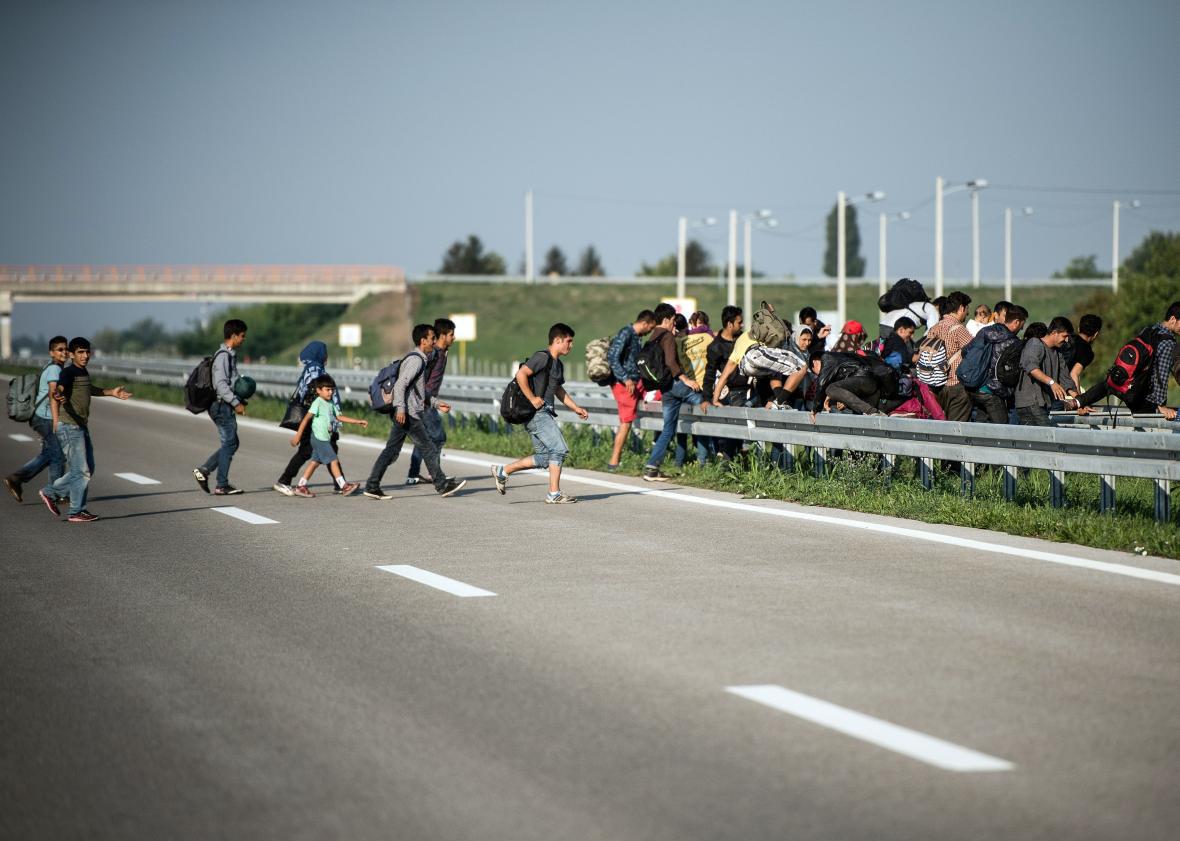In media coverage, including mine, of the unprecedentedly high number of displaced people around the world today, the terms migrant and refugee have often been used interchangeably, but there is an important political and legal distinction between the two.
According to the U.N. High Commissioner for Refugees, refugees “are persons fleeing armed conflict or persecution” and seeking safety in other countries, while migrants “choose to move not because of a direct threat of persecution or death, but mainly to improve their lives by finding work, or in some cases for education, family reunion, or other reasons.” Refugees, unlike migrants, are entitled to certain legal protections under the 1951 Refugee Convention—most crucially, that they cannot be returned to situations where their life or freedom would be threatened.
The majority of the people attempting to reach Europe this year are leaving conflict-torn countries like Syria, Afghanistan, and Somalia, or harsh dictatorships like Eritrea, leading to calls for them to be described as refugees rather than migrants. Al Jazeera recently announced an editorial policy of not using the term migrants to describe those crossing the Mediterranean, with online editor Barry Malone writing that “It has evolved from its dictionary definitions into a tool that dehumanizes and distances, a blunt pejorative. … Migrant deaths are not worth as much to the media as the deaths of others—which means that their lives are not.” Not everyone is on board: Today’s New York Times homepage headline reads: “At Least 150 Migrants Feared Dead After Boat Sinks Off Libya,” and CNN two days ago reported “Hungary to send more police to secure borders from migrants.” On Thursday, I put up “Scores of Migrants Found Dead in a Truck in Austria” on this blog. None of these headlines, I’m assuming, implies an assumption about the motivations of the people being described. As it’s generally used, migrant is simply the more general term.
As opposed to migrant, the word refugee has political power. One reason why immigration restrictionists in Europe often prefer the term asylum seekers, which describes people whose claim of refugee status has not been definitively verified, is that it casts doubt on their motivations. Here in the United States, people entering the country from Latin America are rarely described as refugees, though given the evidence that growing numbers of them are fleeing drug-related violence in Central America, perhaps they should be. As Emily Bazelon recently discussed in the New York Times Magazine, this election cycle has also seen the unwelcome return of the term illegal, as opposed to undocumented immigrant or illegal immigrant, which further dehumanizes those it describes.
There are also times when refugee is seen as a slur. After Hurricane Katrina, black leaders argued that the media’s frequent use of the term, usually used to describe foreigners, for people who had left New Orleans for other parts of the the country after the storm, was racist, labeling black Americans as some sort of “other.” As we mark the 10th anniversary of the storm this week, refugee still frequently appears in headlines.
There are reasonable questions about how far the use of the term should be extended. The Times’ Somini Sengupta notes today that there’s an ongoing debate over whether those forced to move by effects of climate change like desertification and sea level rise should be described as refugees. While the definitions are rarely perfect and the lines often fuzzier than many advocates suggest, it’s true that migrants as a catch-all term obscures more than it reveals about one of the world’s most important stories. With the combined effects of conflict, growing economic inequality, and ecological change creating an unprecedentedly large population of people on the move, we should all strive to be more accurate.
Also in Slate, see the latest photographs from the European migrant crisis.
Read more of Slate’s coverage of the European migrant crisis.
